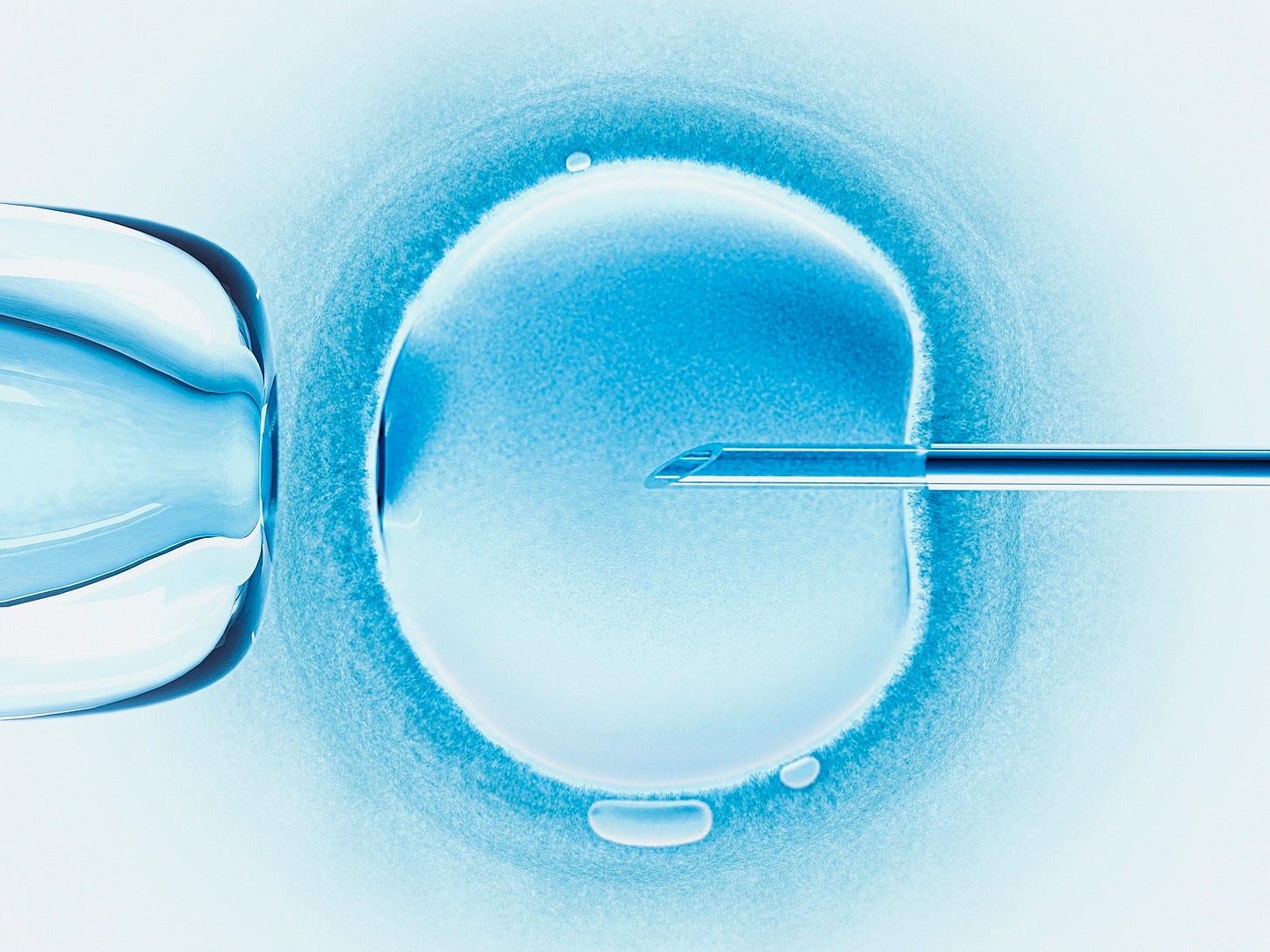If you’re not already worried about fetal personhood, you should be. In Alabama last week, the state Supreme Court ruled that embryos are “children,” and that families whose embryos were destroyed in an accident could sue for wrongful death. The justices decided that the law “applies to all unborn children, regardless of of their location.”
If “location” wasn’t enough to send you into a tailspin, consider this assertion from Justice Jay Mitchell:
“Unborn children are ‘children’…without exception based on developmental stage, physical location, or any other ancillary characteristics.”
ANCILLARY CHARACTERISTICS? Is that what they call women now? This has always been the danger of fetal personhood—it deprives pregnant people of their humanity.
Now, clearly this will have a huge impact on IVF. For example, discarding unused embryos is common during fertility treatments; Alabama doctors won’t be able to do this if embryos are characterized as “extrauterine children.” (Yes, that’s really what the justices called them.)
In a release, Barbara Collura, CEO of RESOLVE: The National Infertility Association, said the new legal framework “may make it impossible to offer services like IVF,” and that it “remains unclear what this decision means for families who currently have embryos stored at these clinics.” Collura also spoke to The Washington Post about the questions that the decision opens up for fertility clinics in Alabama:
“If a group of cells is a person, can you freeze them? Can you do genetic testing on them? What if you transfer an embryo to a person and she doesn’t get pregnant?”
In short: it’s going to be a mess for fertility doctors and patients. That said, this decision is not just about IVF—by further enshrining fetal personhood, Alabama is setting the stage for even more policies that punish pregnant people and strip away their rights.
Now, thanks to a 2018 ballot measure measure, Alabama already recognized fetal personhood —and the state has been punishing pregnant women accordingly. Alabama is notorious for targeting pregnant women accused of substance abuse, preemptively jailing them to ‘protect’ their fetuses, even though doing so has endangered women and their pregnancies.
Read about fetal personhood and Alabama in this interview with Pregnancy Justice:
And Alabama Attorney General Steve Marshall has been itching to punish women who get abortions and anyone who helps them. Early last year, Abortion, Every Day reported that he was planning on getting around the state’s prohibition on arresting abortion patients by charging anyone who used abortion medication with chemical endangerment.
Marshall has also argued that groups helping people leave the state for abortion are participating in a “criminal conspiracy,” and that even telling someone about an out-of-state clinic could be a crime:
“One cannot seriously doubt that the State can prevent a mobster from asking a hitman to kill a rival because the agreement occurred through spoken word. So too here for conspiracies to obtain an elective abortion.”
What’s more, Marshall made a legal argument last year that Alabama can restrict pregnant women’s travel—saying that if the state can prevent sex offenders from leaving, there’s a precedent to do the same with pregnant people who might want an abortion.
Since I reported on Marshall’s claim about travel, I’ve heard over and over again how I’m overly worried—that’s there’s no way Alabama could stop women from leaving the state because it’s straight up unconstitutional. But what the state Supreme Court’s ruling makes clear is that they believe fetal personhood trumps the law.
Robin Marty, Director of Operations for the West Alabama Women's Center and author of The New Handbook for a Post-Roe America, flagged this statement from Chief Justice Tom Parker:
“A good judge follows the Constitution instead of policy, except when the Constitution itself commands the judge to follow a certain policy. In these cases, that means upholding the sanctity of unborn life, including unborn life that exists outside the womb.”
Marty asks, “Does he mean that constitutional rights that are supposed to be inherent can be ignored if the outcome favors ‘unborn life’?” She points to the pregnant women who’ve been jailed, and Marshall’s statements about criminalizing those who help people leave the state for care: “What other constitutional rights are they planning to ignore in the name of protecting these so-called “children?”
Unfortunately, I think we know exactly what rights they’re planning on ignoring—they’ve been telling us for years one way or another. It will be all of them, and it won’t stop at Alabama.
As Mary Ziegler points out at CNN, “the goal is to slowly build the case that a fetus or even an embryo is a person for every purpose and circumstance.” That means abortion bans in every state, women punished for ending their pregnancies, and possible mandates that every frozen embryo be implanted.
There’s no way to overreact here: it’s as bad as it sounds. And while last week’s decision is of course about IVF, we can’t be fooled into thinking that’s the reason for the ruling. Anti-abortion activists, lawmakers and judges have a very clear plan they’re rolling out right now—and fetal personhood undergirds all of it.






Christian Nationalists (like these Alabama judges) believe our Constitution is rooted in the Bible. His comment is Christo-fascist on its face. It absolutely is what they will do to the whole country if they win in November. Jessica is not overreacting. None of us are. This is real.
There is an important point about the Alabama court's opinion that is worth highlighting. The concurring opinion of the chief justice is explicitly theological, i.e. he acknowledges that the amendment being interpreted is based on enshrining a particular theological belief in the Alabama constitution. Here is what he says (I am not making this up): " In summary, the theologically based view of the sanctity of life adopted by the People of Alabama encompasses the following: (1) God made every person in His image; (2) each person therefore has a value that far exceeds the ability of human beings to calculate; and (3) human life cannot be wrongfully destroyed without incurring the wrath of a holy God, who views the destruction of His image as an affront to Himself. Section 36.06 recognizes that this is true of unborn human life no less than it is of all other human life -- that even before birth, all human beings bear the image of God, and their lives cannot be destroyed without effacing his glory." From a messaging point of view, this reinforces what many people have been saying: that anti-abortionists are largely motivated by religious belief. From a legal point of view, it renders the decision vulnerable on establishment clause grounds. At some point, the Supreme Court is going to have to face the uncomfortable truth that legislating religious beliefs is not kosher, as far as the U.S. Constitution is concerned.